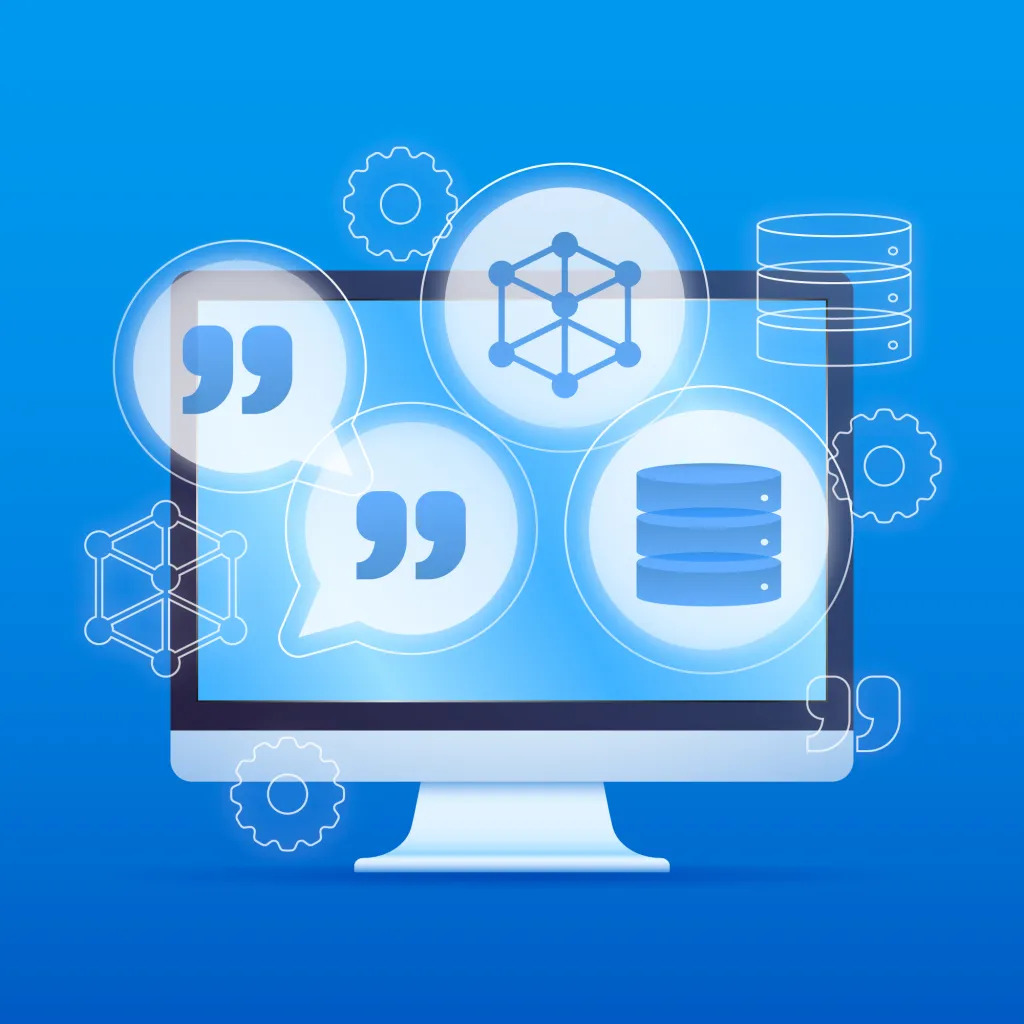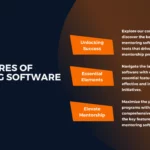
What do you think will be the most popular mentoring software feature in the future? 🧐
If you want to learn, you can read this article. If you want to make it happen, you can come back to the future with us! 🚀
Future software platforms are shaped by our current needs. There are a lot of players in the market now and with that comes difficulty in finding what software is right for your organisation and its needs.
In this article, we will talk about emerging trends and innovations in mentoring software platforms.
Personalization and Customization
Discuss how the future of mentoring software will focus on personalization and customization. 💡
Here are a few ways that mentoring software is likely to become more personalized and customizable in the future:
- Tailored Mentoring Programs: The Mentoring software could include personalized mentoring plans that are customized for each individual, based on factors such as their career aspirations, skill gaps, and learning preferences.
- Adaptive Learning: The software will increasingly use adaptive learning algorithms to personalize the learning experience for each individual. This means that the software will be able to track each person’s progress and adjust the mentoring experience in real-time to meet their specific needs.
- Personalized Recommendations: It will use data analytics and AI to provide personalized recommendations for both mentees and mentors. This could include recommending relevant training materials, suggesting potential mentors or mentees, and providing feedback on progress.
- Customizable Interfaces: Mentoring software will offer more customizable interfaces, allowing users to personalize their mentoring experience.
- Dynamic Content: The software will offer more dynamic content, enabling users to create their own learning paths. Also will provide to choose from a wide range of resources that match their specific needs and preferences. This could include personalized learning modules, interactive quizzes, and videos.
Overall, the future of mentoring software is likely to be heavily focused on personalization and customization, as organizations look to provide a more tailored mentoring experience for their employees. By leveraging the latest technology and data analytics, mentoring software will be able to cater to individual needs and preferences. Also will help to improve engagement, motivation, and overall effectiveness of the mentoring program.
Highlight how mentoring software will be able to cater to individual needs and preferences. 💼
Mentoring software is evolving to become more personalized and tailored to the individual needs and preferences of each user. This is possible due to advancements in technology such as data analytics, artificial intelligence (AI), and machine learning algorithms. Here are some ways in which mentoring software will be able to cater to individual needs and preferences:
- Personalized mentoring plans
- Adaptive learning
- Personalized recommendations
- Customizable interfaces
- Dynamic content
In summary, by leveraging the latest technology and data analytics, mentoring software will help improve engagement, motivation, and overall effectiveness of the mentoring program.
Artificial Intelligence (AI)
Discuss the growing and anticipated trend of AI in mentoring software. 🧠
Here are some ways in which AI is being incorporated into mentoring software:
- Matching mentors and mentees: This allows for more effective and personalized mentoring relationships.
- Adaptive learning: AI is being used to track the progress of mentees and adapt the mentoring experience in real-time. This allows the software to personalize the mentoring experience. Also this allows to adjust the content, pacing, and learning objectives based on the mentee’s progress.
- Personalized recommendations: AI algorithms are being used to provide personalized recommendations for mentors and mentees. These recommendations can include relevant training materials, suggested mentors or mentees, and feedback on progress.
- Natural Language Processing (NLP): NLP is a type of AI that enables mentoring software to understand and interpret human language. This allows for more effective communication between mentors and mentees, as well as better analysis of mentoring conversations.
- Data analytics: AI is being used to analyze large amounts of data generated by mentoring programs. This can help identify patterns, trends, and areas for improvement. Also provide insights into the effectiveness of mentoring relationships.
While AI has the potential to greatly enhance mentoring programs, there are also concerns about potential biases and privacy issues. It is important to ensure that AI algorithms are transparent, fair, and respect user privacy. this will be even more important in the future.Additionally, human oversight and input is still necessary to ensure the effectiveness of mentoring relationships.
Highlight how AI will be able to provide personalized recommendations and feedback to mentees and mentors. 📢
AI algorithms are capable of analyzing large amounts of data, including the goals and preferences of mentees and mentors. Also their past interactions within the mentoring software. This data can be used to provide personalized recommendations and feedback to both parties.
For example, AI can analyze a mentee’s learning style and progress. Also provide personalized recommendations for training materials that are most relevant to their needs. The software can also suggest mentors who have similar backgrounds or experiences to the mentee, increasing the likelihood of a successful mentoring relationship.
In short, AI has the potential to greatly enhance the mentoring experience by providing personalized recommendations and feedback to both mentors and mentees. However, it is important human oversight.
Virtual Reality (VR) and Augmented Reality (AR)
Discuss how VR and AR will be used in mentoring software in the future. 🧐
Here are some ways in which VR and AR are being incorporated into mentoring software:
- Immersive training experiences: VR can be used to create immersive training experiences that simulate real-world scenarios. This allows mentees to practice skills and techniques in a safe, controlled environment, without the risk of real-world consequences.
- Virtual coaching: VR and AR can be used to provide virtual coaching and feedback to mentees. For example, a VR headset could be used to provide a mentee with real-time feedback on their body language during a simulated job interview.
- Remote mentoring: VR and AR can be used to facilitate remote mentoring relationships. For example, a mentor could use AR to provide guidance and feedback to a mentee who is working on a physical task in a remote location.
- Virtual collaboration: VR and AR can be used to facilitate virtual collaboration between mentors and mentees. For example, a VR meeting room could be used to hold virtual mentoring sessions with multiple mentees at once, regardless of their physical location.
- Gamification: VR and AR can be used to gamify the mentoring experience, making it more engaging and motivating for mentees. For example, a VR game could be used to teach mentees new skills or knowledge, or to reinforce the lessons learned during mentoring sessions.
Thus, VR and AR in the future have the potential to greatly enhance the mentoring experience. So there are also concerns about the cost and accessibility of these technologies. It is important to ensure that VR and AR tools are accessible to all mentees, regardless of their financial or physical resources. Additionally, human oversight and input is still necessary to ensure the effectiveness of mentoring relationships, even with the use of VR and AR technologies.
Highlight how these technologies will enable more immersive and engaging mentoring experiences. 🥳
Here are some ways in which these technologies can achieve this:
- Realistic simulations
- Interactive learning
- Personalized feedback
- Gamification
- Remote mentoring
Hence, VR and AR technologies have the potential to make mentoring more immersive, engaging, and effective. By providing realistic simulations, interactive learning experiences, personalized feedback, gamification, and remote access, these technologies can enhance the mentoring experience. Also it can help mentees achieve their goals.
Gamification
Discuss how gamification will be used in mentoring software in the future. 🕹
Gamification is becoming an increasingly popular tool in mentoring software to help engage and motivate mentees. Here are some ways in which gamification can be used in mentoring software in the future:
- Setting goals and tracking progress: Gamification can help motivate mentees to work towards specific targets. Also it can give them a sense of accomplishment when they reach them.
- Unlocking achievements and rewards: Mentoring software can help incentivize mentees to stay engaged with the mentoring process and keep working towards their goals.
- Simulating real-world scenarios: Gamification can be used to create simulations of real-world scenarios that mentees might encounter in their professional lives. This can help mentees practice important skills and techniques in a safe and controlled environment. Also making the learning experience more engaging and interactive.
- Encouraging collaboration: Gamification can be used to encourage mentees to collaborate with each other and share knowledge and skills. For example, mentoring software can use team-based challenges or competitions to incentivize mentees to work together and learn from each other.
- Providing feedback and coaching: Gamification can be used to provide mentees with feedback and coaching, based on their individual performance and progress. For example, mentoring software can use data analytics to identify areas where mentees are struggling and provide personalized coaching. Also it can provide support to help them improve.
To clarify, by setting goals, unlocking achievements, simulating real-world scenarios, encouraging collaboration, and providing feedback and coaching, gamification can help mentees stay engaged and motivated throughout the mentoring process.
Highlight how gamification can motivate mentees and make the learning process more enjoyable. ☕
Gamification can be a highly effective way to motivate mentees and make the learning process more enjoyable. Here are some reasons why:
- Provides a sense of achievement: By unlocking badges or reaching milestones, mentees can feel a sense of accomplishment, which can motivate them to keep working towards their goals. This can be especially effective for mentees who may feel overwhelmed or discouraged by the learning process.
- Encourages healthy competition: Many people thrive on competition, and gamification can provide a healthy outlet for this. Leaderboards and other competitive elements can help mentees push themselves to do their best. Also it can encourage collaboration with others in the program.
- Offers immediate feedback: Gamification can provide mentees with immediate feedback on their progress, which can help them stay motivated and engaged. This can also help mentees identify areas where they may need more support or resources to achieve their goals.
- Creates a more engaging learning experience: Gamification can help make the learning process more interactive and enjoyable by providing opportunities for mentees to explore, experiment, and discover new things. This can help keep mentees engaged and motivated throughout the mentoring program.
To explain, by providing a sense of achievement, encouraging healthy competition, offering immediate feedback, and creating a more engaging learning experience, gamification can help mentees stay motivated and engaged in their learning journey.
Integration with Other Tools
Discuss how the future of mentoring software will focus on seamless integration with other tools. ☯
Here are some ways in which integration will be a key trend in the future of mentoring software:
- Integration with communication tools: This will enable mentors and mentees to communicate more effectively and easily, regardless of their location.
- Integration with learning management systems: This way will provide mentors with a comprehensive overview of the mentee’s learning journey. Also will making it easier for them to provide targeted support and feedback.
- Integration with HR systems: This will enable organizations to track the impact of mentoring programs on employee performance, retention, and engagement.
- Integration with performance management tools: This tool will enable mentees to identify areas where they need to improve and develop the skills they need to achieve their career goals.
- Integration with other learning tools: This will enable mentees to access a variety of learning resources to support their development. Also provide mentors with a comprehensive view of the mentee’s learning journey.
Therefore, seamless integration with other tools will be a key trend in the future of mentoring software. In the future, by integrating with communication tools, learning management systems, HR systems, performance management tools, and other learning tools, mentoring software will be able to provide a more efficient and effective mentoring experience.
Highlight how this will enable a more streamlined and future mentoring experience and make it easier for organizations to manage their mentoring programs. 📈
By enabling seamless integration with other tools, mentoring software will be able to provide a more streamlined mentoring experience for both mentors and mentees. For example, integration with communication tools will enable mentors and mentees to communicate more easily and effectively, regardless of their location. This can help to overcome the challenges of remote mentoring. Also can make it easier for mentors to provide guidance and support to their mentees.
Integration with learning management systems will also make it easier for organizations to manage their mentoring programs. By tracking and managing mentees’ progress, organizations can gain insights into the effectiveness of their mentoring programs. Also they can identify areas where improvements can be made. This can help organizations to ensure that their mentoring programs are aligned with their goals and objectives, and provide targeted support to mentees to help them achieve their career aspirations.
Similarly, integration with HR systems and performance management tools can help organizations to track the impact of mentoring programs on employee performance, and engagement. This can provide valuable insights into the effectiveness of mentoring programs. Also can enable organizations to make data-driven decisions to improve their mentoring programs.
Thus, seamless integration with other tools can help to make mentoring more efficient, effective, and streamlined. By providing a more integrated mentoring experience, mentoring software can help organizations to manage their mentoring programs more effectively. Also can provide targeted support to mentees to help them achieve their career goals.
Conclusion
Summarize the key points discussed in the post.
The post discusses the emerging trends and innovations in mentoring software. This article highlights the growing focus on personalization and customization in mentoring software, which enables organizations to cater to the individual needs and preferences of mentees and mentors. The post also explores the increasing use of AI in mentoring software, which can provide personalized recommendations and feedback to mentees and mentors. Additionally, the post discusses the potential of VR, AR, and gamification in mentoring software, which can make the learning process more immersive, engaging, and enjoyable. Finally, the post highlights the importance of seamless integration with other tools, which can provide a more streamlined and efficient mentoring experience, and help organizations to manage their mentoring programs more effectively.
Discuss the importance of staying up-to-date with emerging trends and innovations in mentoring software.
Staying up-to-date with emerging trends and innovations in mentoring software can help organizations stay competitive in their industries. With advancements in AI, VR, AR, and gamification, organizations that adopt these technologies in their mentoring programs can offer more engaging and effective learning experiences. This can give them an edge over their competitors and attract top talent to their organization.
Moreover, staying up-to-date with emerging trends and innovations in mentoring software can help organizations to streamline their mentoring programs and make them more efficient. With seamless integration with other tools, organizations can save time and resources on managing their mentoring programs. So can enabling them to focus on providing quality mentorship to their mentees.
Sounds exciting?
We would be very happy to support your design and run your mentoring programs
Book your Demo

